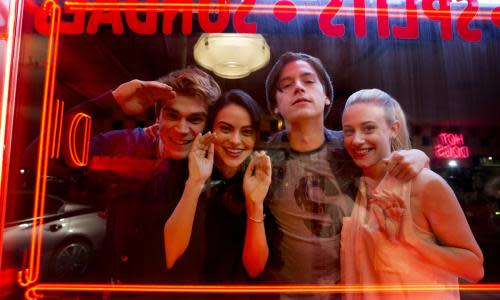Riverdale: a campy, maximalist romp that leans into its own post-comic book absurdity

If streaming histories can divine their viewers’ personalities, then mine tells a classic tale of commitment-phobia. My Stan account is a wasteland of half-watched series and unfinished business; it takes me a hand-cramping six swipes to get through the “continue watching” section of Netflix.
But there’s one show to which I have, against all odds, remained faithful through every last (and often gruelling) episode. That show is Riverdale.
Related: The Leftovers: a perfectly grim but utterly compelling post-apocalypse drama
Let’s get this out of the way. Riverdale is unhinged. It is, at times, so painfully bad it cannot even be classed in the “so bad it’s good” category of hate-watching. It’s certainly not a show for the faint-hearted, or really anyone with a heart that desires a consistent plot with logical narrative progression and fully formed characters.
Embrace its flaws, though, and Riverdale becomes something else entirely: a campy, maximalist romp that leans into the natural absurdity of a teen murder mystery and is all the better for it.
It wasn’t always like this. The first season, and its most critically acclaimed, started with lofty ambitions. Created by Roberto Aguirre-Sacasa, Riverdale’s slick, noir-ish reworking of the Archie comics quickly garnered fans, as well as Twin Peaks – or Tween Peaks – comparisons.
When a dead body is found in the woods of a small town, it’s up to a ragtag gang of high schoolers to solve the mystery. But because this is a show that counts Greg Berlanti (of Dawson’s Creek fame) among its executive producers, there’s a healthy dose of teen angst too.
Veronica (Camila Mendes) is figuring out a fraught relationship with her maybe-mafia-don father. Betty (Lili Reinhart) is in love with her best friend Archie (KJ Apa), who’s torn between singing and football – a dilemma for the ages. Jughead (a dark-haired, slightly emo Cole Sprouse, in genuinely inspired casting) reconnects with his deadbeat dad. (There are a lot of daddy issues in this show.)
One can imagine a world in which Riverdale continues down this path, already well-trodden by predecessors like Veronica Mars and Pretty Little Liars. Thankfully, that is not this world.
It only takes three episodes for Riverdale to hint at its most bonkers self: a sequence where Veronica and Betty take revenge on a – granted, cruel – classmate by seducing him, drugging him and almost boiling him alive in a hot tub.
But it’s not until the second season (and beyond) that it truly starts to go off the rails. With the central murder mystery done and dusted, Riverdale finds new impetuses to keep itself going. And boy, are there a lot of them.
To attempt to summarise all the tragedies that befall this small town is to set yourself up for failure, but allow me to try anyway: an evil maple syrup oligarchy; a cult led by a white-robed Chad Michael Murray; a juvenile prison that siphons inmates into an underground fight club; a murderous role-playing board game – and three musical episodes.
Related: Cheer: Netflix's cheerleading docuseries is an exhilarating cirque du insanity
As the show spirals further and further into its own insanity, Riverdale approaches that rarest of TV qualities: self-awareness. It hasn’t so much jumped the shark as it has leapt over it with limbs flailing, leaning so far into its “more is more” school of thought that it starts to feel like a tongue-in-cheek self-parody.
Case in point: its latest (and, in my controversial opinion, best) season, is a quasi-homage to 90s bestseller The Secret History, set at an eerie, classics-obsessed prep school with villains called Donna Sweett and Bret Weston Wallis. With thinly veiled caricatures like these, who needs friends?
Riverdale may not be essential viewing. But it’s hysterical, addictive and right now – when real-life events often feel absurd – it reminds us that there’s always something more absurd out there.
• Riverdale is available to stream in Australia on Netflix

